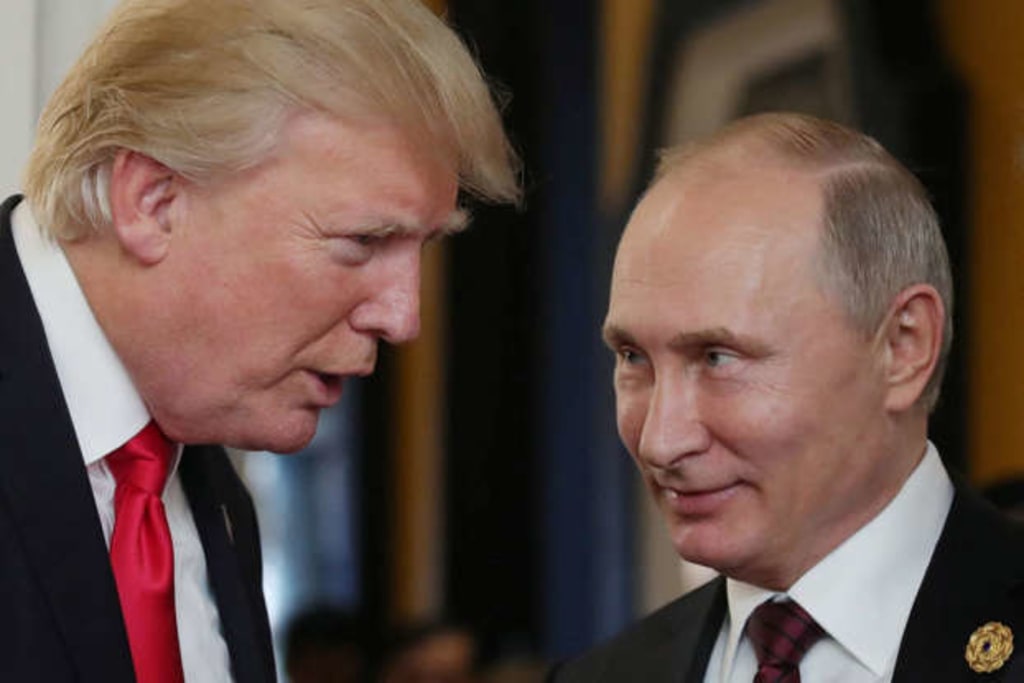Donald Trump's Response to Wagner Revolt Uncovers His Weakness for Putin
The connection between previous U.S. President Donald Trump and Russian President Vladimir Putin has for some time been a subject of theory and discussion.

Pundits contend that Trump's activities and explanations during his residency in the White House exhibited a remarkable liking for Putin, recommending a possible weakness for the Russian chief. One occurrence that especially featured this supposed predisposition was Trump's response to the Wagner revolt — a huge occasion that uncovered his tendency towards Putin. This article will investigate Trump's reaction to the Wagner rebellion, breaking down the ramifications of his activities and articulations comparable to his supposed adoration for Putin.
Foundation: The Wagner Insurrection
The Wagner Gathering is a Russian confidential military project worker accepted to have close connections to the Kremlin. In July 2020, reports arose about a revolt inside the Wagner Gathering after a gathering of Russian soldiers of fortune purportedly conflicted with Syrian system powers. The episode brought about a few setbacks and uncovered breaks inside the positions of the mysterious hired fighter association. Given Wagner's relationship with the Russian government and its contribution in clashes abroad, the revolt conveyed huge international ramifications.
Trump's Response
Trump's quietness regarding this situation:
Following the Wagner insurrection, Trump remained shockingly peaceful, notwithstanding his inclination to remark on foreign relations. This quietness was as an unmistakable difference to his typical bluntness on issues concerning Russia. Trump's inability to address the rebellion brings up issues about his inspirations and his expected hesitance to reprimand activities that could ponder adversely Putin.
Making light of the importance:
At the point when examined concerning the Wagner rebellion, Trump made light of its significance, alluding to it as "simply one more debate." This minimalization of a serious occasion indicated a contemptuous demeanor towards Russian military hostility and a reluctance to face Putin's system. Such lack of concern additionally built up the thought of Trump's affection for the Russian president.
Safeguarding Putin's activities:
On various events, Trump guarded Putin against charges of wrongdoing, remembering obstruction for the 2016 U.S. official political race. Trump's refusal to acknowledge the discoveries of U.S. insight organizations and his steadfast help for Putin caused a commotion among pundits and energized hypotheses about his partiality for the Russian chief. The Wagner insurrection gave one more chance to Best to show his predisposition towards Putin.
Likely inspirations:
Trump's weakness for Putin could be established in a few elements. In the first place, Trump's financial matters in Russia have for some time been a subject of examination, with charges of monetary connections to Russian substances. Such associations could have impacted his way of behaving towards Putin, as he might have been worried about safeguarding his own advantages. Second, Trump's esteem for tyrant pioneers and his craving for strongman legislative issues might have added to his proclivity for Putin. At last, some contend that Trump's deference for Putin originates from a common perspective, described by doubt towards global organizations, patriotism, and a dismissal for popularity based standards.
Influence on U.S.- Russia relations:
Trump's apparent bias towards Putin adversely affected U.S.- Russia relations. Pundits contend that his hesitance to consider Russia responsible for its activities, whether it be the Wagner insurrection or different occasions of hostility, debilitated America's position on the worldwide stage. This absence of solid authority permitted Putin's system to act with relative exemption, further subverting worldwide security.
Sabotaging trust in the U.S. government:
Trump's activities and explanations in regards to Russia and Putin dissolved public confidence in the U.S. government's capacity to go up against unfamiliar enemies. By excusing or making light of huge occasions like the Wagner rebellion, Trump subverted the validity of insight offices and specialists who tried to feature Russia's terrible exercises. This disintegration of trust had long haul ramifications for America's public safety and its remaining in the global local area.
Donald Trump's response to the Wagner revolt shed light on his supposed weakness for Russian President Vladimir Putin. From his quiet regarding this situation to his pretentious demeanor and guard of Putin's activities, Trump's conduct recommended a predisposition leaning toward the Russian chief. This tendency had boundless ramifications, including the debilitating of U.S.- Russia relations and the disintegration of confidence in the U.S. government's capacity to stand up to unfamiliar foes. While the full degree of Trump's proclivity for Putin stays a subject of discussion, his reaction to the Wagner uprising gave a convincing case to the individuals who contended for his reverence of the Russian president.





Comments
There are no comments for this story
Be the first to respond and start the conversation.